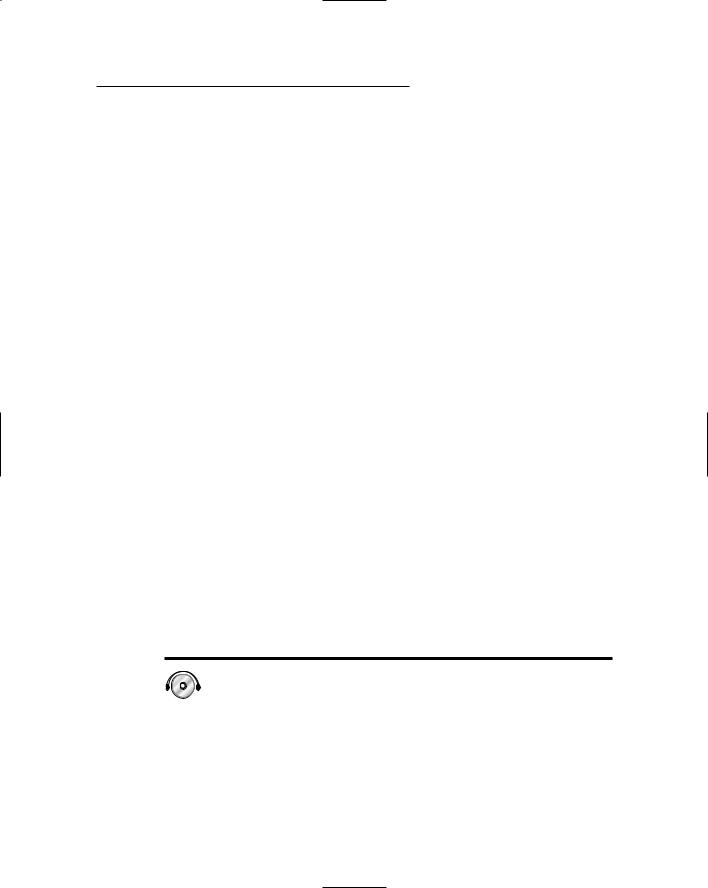
Arabic_for_Dummies
.pdf
156 Part II: Arabic in Action
Beginning a phone conversation
You can begin a phone conversation in a number of ways. The most common, whether you’re the caller or the person answering the phone, is to simply say allo (all-low; hello).
It’s proper etiquette to state your name right after the person who picks up the phone says allo, particularly if you don’t know that person. If you’re the caller, you may say ‘anaa (an-nah; I am) followed by your name. Alternatively, you may say haadhaa (M) / haadhihi (F) (haa-zaah / haa-zee-hee; this is) followed by your name. A familiar phrase you can also use after you say allo is ‘as-salaamu ‘alaykum (ass-sa-laam-ou a-lai-koum; hello) or ‘ahlan wa sahlan
(ahel-lan wah sahel-lan; hi). Flip to Chapter 3 for more on greetings and making small talk.
Talkin’ the Talk
Kamal calls his friend Rita at home.
Kamal:
Rita:
Kamal:
Rita:
Kamal:
Rita:
Kamal:

Chapter 9: Talking on the Phone 157
Asking to speak to someone
Sometimes, a person other than the one you want to talk to answers the phone. A common phrase to help you ask for the person you called to speak with is hal (insert name here) hunaa? (hal [name] hoo-naah), which means “Is (name) here?”
Alternatively you can also use the personal pronouns huwa (if the person you’re looking for is a man) or hiya (in the case of a woman) instead of using the person’s name.
Talkin’ the Talk
Kamal calls his friend Rita at home. Rita’s mom, Souad, answers the phone, and Kamal asks to speak with Rita.
Kamal: |
allo. |
|
all-low. |
|
Hello. |
Souad: |
allo. |
|
all-low. |
|
Hello. |
Kamal: |
as-salaamu ‘alaykum. ‘anaa Sadiiq rita. hal hiya |
|
hunaa? |
|
ass-sa-laam-ou a-lai-koum. an-ah sah-deek ree-taa. |
|
hal hee-yah hoo-naah? |
|
Hello. I am a friend of Rita. Is she here? |
Souad: |
na’am hiya hunaa. Maa ‘ismuk? |
|
na-em hee-ya hoo-naah. maah ees-muhk? |
|
Yes, she is here. What’s your name? |
Kamal: |
haadhaa kamal. |
|
haa-zaah kamal. |
|
This is Kamal. |
Souad: |
intaDHir daqiiqa min faDlik. |
|
in-tah-zer dah-kee-kah meen fah-del-ik. |
|
Wait one minute please. |
Rita |
allo kamal. |
|
all-low kamal. |
|
Hello Kamal. |
|
|

158 Part II: Arabic in Action
Words to Know
‘anaa |
an-aah |
I |
hiya |
hee-yah |
her/she |
huwa |
hoo-wah |
him/he |
Sadiiq |
sah-deek |
friend (M) |
Sadiiqa |
sah-dee-kah |
friend (F) |
hunaa |
hoo-naah |
here |
intaDHir |
in-tah-zer |
wait |
daqiiqa |
dah-kee-kah |
minute |
Making Plans Over the Phone
The phone is useful not only for staying in touch with friends and family but also for making mawaa’id ‘ijtimaa’iiyya (mah-waah-eed eej-tee-maah-ee-yah; social arrangements) as well as mawaa’id ‘amalliya (mah-waah-eed ahm-ahl- ee-yah; business arrangements). This section covers the specific terminology you need for each of these situations.
Making social plans
If you’re talking with a friend, you’re free to be a bit more informal than if you were calling a business. Some common words to help you make social arrangements with your friends are:
hayyaa binaa! (hah-yaah bee-naah; Let’s go!)
maT’am (ma-tam; restaurant)
siiniimaa (see-nee-mah; movie theater)
matHaf (maht-haf; museum)
waqt faarigh (wah-ket faa-ree-gh; free time)

Chapter 9: Talking on the Phone 159
Talkin’ the Talk
Selma calls her friend Mark on his haatif selulayr (cellphone) so that they can make dinner plans.
Selma: allo. all-low.
Hello.
Mark: allo. all-low.
Hello.
Selma: ahlan mark. haadhihi selma. ahel-lan mark. haa-zee-hee selma.
Hi Mark. This is Selma.
Mark: ahlan selma! shukran li mukaalamatukii. ahel-lan selma! Shook-ran lee moo-kaa-lah-mah- too-kee.
Hi Selma! Thanks for your call.
Selma: ‘afwan. kayf Haalak? ah-feh-wan kay-ef haa-lak?
You’re welcome. How are you?
Mark: al-Hamdu li-llah. wah ‘anti? al-ham-doo li-llah. wah ahn-tee?
I’m doing well. And you?
Selma: al-Hamdu li-llah. hal ‘induka waqt faarigh ghadan? al-ham-doo lee-lah. hall een-doo-kah wah-ket faa-ree-gh gha-dan?
I’m doing well. Do you have any free time tomorrow?
Kamal: na’am. ‘anaa mawjood ma’a as-saa’a as-saadisa. nah-am. ah-nah maw-juud mah-ah ah-sah-ah ah-sah-dee-sah.
Yes. I’m free around 6:00.
Selma: hal turiidu ‘an tadh-hab ma’ii ‘ilaa al’maT’am ma’a as-saa’a as-saabi’a?
hall too-ree-du ann taz-hab ma-eeh ee-laah al-ma-tam ma-ah ass-saa-ah ass-saa-bee-ah?
Would you like to go with me to the restaurant at 7:00?

160 Part II: Arabic in Action
Kamal: |
Tab’an! ‘anaa sa uHibbu dhaalika. |
|
tah-bah-an! An-aah sah oo-hee-boo zaa-lee-kah. |
|
Of course! I would like that. |
Selma: |
mumtaaz! ‘ilaa al-ghad. |
|
moom-taaz! ee-laah al-gad. |
|
Excellent! See you tomorrow. |
Kamal: |
‘ilaa al-ghad! |
|
ee-laah al-gad! |
|
See you tomorrow! |
|
|
Words to Know
mukaalamatuka |
moo-kaa-lah-mah-too-kah |
your call (M) |
mukaalamatukii |
moo-kaa-lah-mah-too-kee |
your call (F) |
‘induka |
een-doo-kah |
you have (M) |
‘induki |
een-doo-kee |
you have (F) |
waqt |
wah-ket |
time |
faarigh |
faa-ree-gh |
empty |
saa’a |
saa-ah |
hour |
uHibbu |
oo-hee-boo |
I like |
dhaalika |
zaa-lee-kah |
that |
al-ghad |
al-gad |
tomorrow |
Making business appointments
Arranging personal get-togethers with friends or family is always fun, but at times you have to conduct business over the haatif, whether you’re setting up a maou’id (maw-oo-eed; appointment) with the dentist or arranging a business ‘ijtimaa’ (eej-tee-maah; meeting) with a client. Interacting with businesses in Arabic requires specific terminology.

Chapter 9: Talking on the Phone 161
Talkin’ the Talk
Susan is calling the Rialto, a company in Casablanca. She reaches the katiba (kah-tee-bah; secretary) and asks to speak with Mr. Ahmed.
Susan: |
allo. |
|
all-low. |
|
Hello. |
Katiba: |
allo. sharikat rialto. daqiiqa min faDlik? |
|
all-low. shah-ree-kaht ree-all-toh. dah-kee-kah |
|
meen fah-del-ik? |
|
Hello. Rialto Inc. Can you wait one minute please? |
Susan: |
Tab’an. |
|
tah-bah-’an. |
|
Of course. |
Katiba: |
‘afwan li-ta’akhur. kayfa ‘usaa’iduk? |
|
ah-feh-wan lee-tah-ah-khur. kay-fah oo-saa-ee-duk? |
|
Sorry to keep you waiting. How may I help you? |
Susan: |
‘uriidu ‘an ‘atakallam ma’a sayyid ‘aHmad. |
|
oo-ree-doo ann ah-tah-kah-llam ma-ah sah-yed |
|
ah-mad. |
|
I would like to speak with Mr. Ahmed. |
Katiba: |
sayyid ‘aHmad mashghul. huwa fii ‘ijtimaa’. |
|
sah-yed ah-mad mash-ghool. hoo-wah fee |
|
eej-tee-maah. |
|
Mr. Ahmed is busy. He is in a meeting. |
Susan: |
mataa sa-yakun mawjood? |
|
mah-taah sah-yah-koon maw-juud? |
|
When will he be available? |
Katiba: |
ayy daqiiqa. |
|
ay dah-kee-kah. |
|
Any minute now. |
Susan: |
shukran jaziilan. sa-’ab-qaa fii l-khat. |
|
shook-ran ja-zee-lan. sa-ah-bek-aah fee al-khah-t. |
|
Thank you very much. I’ll stay on the line. |
|
|

162 Part II: Arabic in Action
Words to Know
maou’id |
maw-oo-eed |
appointment |
‘ijtimaa’ |
eej-tee-maah |
meeting |
sayyid |
say-yehd |
Mr./Sir |
sayyida |
say-yee-dah |
Mrs./Ms. |
ra’iis |
rah-ees |
president |
katiba |
kah-tee-bah |
secretary/ |
|
|
assistant |
sharika |
shah-ree-kah |
company |
‘usaa’iduk |
oo-saa-ee-duk |
help you |
‘uriidu |
oo-ree-doo |
I would like |
mashghul |
mash-ghool |
busy |
Leaving a Message
Sometimes you just run out of luck and can’t get a hold of the person you’re trying to reach. You’re forced to leave a khabaran (khah-bah-ran; message) either on a voice mailbox or with a person.
Dealing with voice mail
When you leave a voice mail message on someone’s haatif, you want to make sure to include the following:
Your ‘ism (ee-seh-m; name)
The waqt al-mukaalama (wah-ket al-muh-kaah-lah-mah; time of the call)
Your raqm al-haatif (rah-kem al-haa-teef; phone number or callback number)
The ahsan waqt li al-mukaalama (ahe-sahn wah-ket lee al-muh-kaah-lah- mah; best times you’re available to talk)

Chapter 9: Talking on the Phone 163
Selma tries to reach Karim by phone but gets this recording instead:
‘ahlan, haadhaa kareem. ‘anaa lastu hunaa wa lakin ‘idhaa takallamta ‘ismuka wa raqamuka sa-’ukallimuk fii ‘asra’ waqt
ahel-lan, hah-zah kah-reem. ah-nah las-too hoo-nah wah lah-keen ee-zah tah-kah-lam-tah ees-moo-kah wah rah-kah-moo-kah sah-oo-kah-lee-moo-kah fee ass-rah wah-ket.
Hi, this is Karim. I’m not in right now, but if you leave your name and number, I’ll get back to you as soon as possible.
Selma’s voice mail message sounds something like this:
‘ahlan wa sahlan karim. haadhihi selma. as-saa’a al-waaHida wa an-niSf yawm al-khamiis. khaabirnii min faDlik ‘inda wuSuulika bi haadha al-khabar ba’ada as-saa’a al-khaamisa. raqmii Sifr waaHid ithnayn thalaatha. shukran!
ahel-lan wah sahel-lan kah-reem. haa-zee-hee selma. ass-saa-ah al-waa-hee- dah wa-ann-nee-sef ya-woom al-kha-mees. khaa-bir-nee meen fahd-lik inn-dah wu-soo-li-kah bee haa-zaah al-khah-bar bah-dah as-saa-ah al-khaa-mee-sah. rak-mee see-fer waa-hid ith-nay-en tha-laah-thah. shook-ran!
Hi Karim. This is Selma. It’s 1:30 in the afternoon on Thursday. Please give me a call back when you get this message anytime after 5:00. My number is 0123. Thanks!
Leaving a message with a person
If you have to leave a khabaran directly with a person, make sure you include your ‘ism and ask the person who picks up the phone to pass along word that you called.
Talkin’ the Talk
Kamal calls his friend Rita at home. Rita isn’t home, and Souad, her mom, answers the phone. Kamal leaves a message for Rita with her mother.
Souad: allo. all-low.
Hello.
Kamal: allo. haadhaa kamal. all-low. haa-zaah kamal.
Hello. This is Kamal.

164 Part II: Arabic in Action
Souad: |
ahlan kamal. |
|
ahel-lan kamal. |
|
Hi Kamal. |
Kamal: |
hal rita fii l-bayt? |
|
hal rita fee al-bay-et? |
|
Is Rita home? |
Souad: |
laa. dhahabat ‘ilaa ad-dukkaan. |
|
laah. za-ha-bat ee-laa ad-doo-kaah-n. |
|
No. She went to the store. |
Kamal: |
mataa sa-tarj’u? |
|
mah-taah sa-tar-jee-oo? |
|
When will she be back? |
Souad: |
sa-tarju’ ba’da saa’a. |
|
sa-tar-joo bah-dah saa-ah. |
|
She will be back in an hour. |
Kamal: |
hal yumkin ‘an tukhbiriihaa bi mukaalamatii? |
|
hal yoo-mek-in ann too-kh-bee-ree-haa bee |
|
moo-kaah-lah-mah-tee? |
|
Is it possible for you tell her that I called? |
Souad: |
Tab’an! |
|
tah-bah-an! |
|
Of course! |
Kamal: |
shukran! ma’a as-salaama. |
|
shook-ran! ma-ah as-sa-laah-mah. |
|
Thank you! Bye. |
Souad: |
ma’a as-salaama. |
|
ma-ah as-sa-laah-mah. |
|
Bye. |
|
|

Chapter 9: Talking on the Phone 165
Words to Know
Bayt |
bah-yet |
home |
dhahaba |
zah-hah-ba |
he went |
dhahabat |
zah-hah-bat |
she went |
dukkaan |
doo-kaah-n |
store |
mataa |
mah-taah |
when |
tarj’u |
tar-jee-oo |
come back |
ba’da |
bah-dah |
after |
hal yumkin |
hal yoo-mek-in |
is it possible |
mukaalamatii |
moo-kaah-lah- |
my call |
|
mah-tee |
|
Most phones in Arabicspeaking countries use the familiar Arabic numerals (1, 2, 3, and so on). Thank goodness you won’t have to struggle to identify the Arabic numbers on the keypad while dialing a number!
